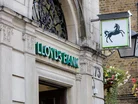Lloyd’s Bank Joins WaveBL’s Trade Documentation Platform

Leading UK financial institution Lloyd’s Bank has partnered with WaveBL, joining its electronic trade documentation platform.
This means clients of Lloyd’s can now transfer blockchain-based electronic Bills of Lading (eBLs) across WaveBL’s membership network, which spans 136 countries.
The new eBLs service available at Lloyd’s unlocks new trade opportunities and sustainability benefits for its clients and marks a significant step in the adoption of blockchain-based technology at incumbent banks.
Indeed, Lloyd’s is the first bank in the UK to join the WaveBL electronic trade documentation platform.
Bills of Lading: Leveraging blockchain to drive efficiencies
While an unfamiliar term for consumers, Bills of Lading are a critical document in the world of international trade.
They are issued by a carrier when a seller dispatches goods to an end customer, effectively acting as a ‘receipt’ for the goods being shipped.
Once payment for goods is complete, or an agreement to pay at a future date is established, a Bill of Lading is released to a buyer so they can claim a product upon its arrival.
Today, the vast majority of Bills of Lading are still in paper form. But now, Lloyd’s can enable its clients to seamlessly transfer fully digital blockchain-based eBLs between organisation on the WaveBL network.
Bills of Lading can now be completed far more efficiently and securely, as eBLs can be passed between different parties in minutes, compared to days for typical paper versions.
Not only does this make international trade more efficient, but it also reduces the risk of the forgery, theft or loss of Bills of Lading documents.
Rogier van Lammeren, Head of Trade and Working Capital Products at Lloyds Bank says: “Paperless trade is the future, with tremendous benefits on offer in terms of economic growth, increased efficiency, reduced risk and environmental sustainability.
“Collaboration and innovation are two of the key factors that will drive and support greater adoption. This new partnership with WaveBL is an example of both in action.
“Our clients now have easy access to a global platform for eBLs to complement our existing suite of digital trade documentation solutions – enabling them to capitalise on opportunities quickly and securely, while reducing their impact on the environment.”
Lloyd’s decision to partner with WaveBL also reduces the need for paper and helps it in its sustainability efforts. And, it forms part of its pledge to the Future of International Trade (FIT) Alliance’s eBLs declaration, which it signed in October 2023.
Founded by the Baltic and International Maritime Council (BIMCO), the Digital Container Shipping Association (DCSA), the International Federation of Freight Forwarders Associations (FIATA), the International Chamber of Commerce (ICC) and Swift – the FIT Alliance aims to raise awareness and accelerate the adoption of a standards-based electronic bill of lading (eBL) across all sectors of the shipping industry.
The declaration highlights joint support for increasing rates of digitalisation in international trade and has a joint goal of delivering 100% uptake in eBLs by 2030.
Ofer Ein Bar, VP of Financial Institutions, WaveBL, adds: "Corporates are looking to prioritise digital trade solutions, and financial institutions have been looking at how they can meet this demand.
“Our partnership with Lloyds Bank, an industry leader in trade digitalisation, represents a strategic leap forward for banks to support corporates as they digitalise while enhancing customer satisfaction."
**************
Make sure you check out the latest edition of FinTech Magazine and also sign up to our global conference series – FinTech LIVE 2024.
**************
FinTech Magazine is a BizClik brand.
- What EU AI Act Means for Governance in Financial SectorRegTech & Compliance
- Saudi Fintech Lendo Secures US$690m JPMorgan FacilityVenture Capital
- Mphasis: Open Banking Will Rewrite Financial DNA of SocietyFinancial Services (FinServ)
- 2025: A Landmark Year for Nature-Positive FinanceSustainability



